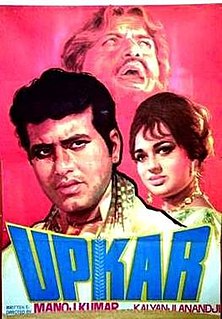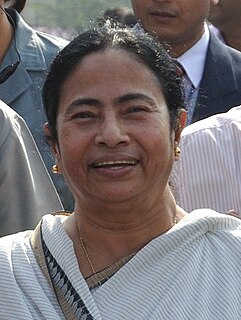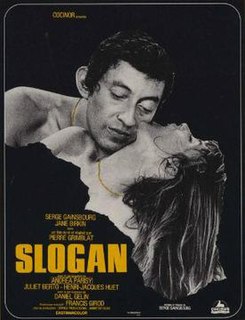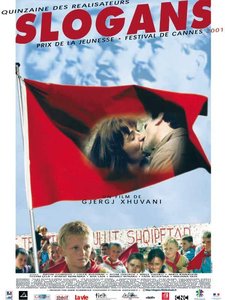
Serge Gainsbourg was a French singer, songwriter, pianist, film composer, poet, painter, screenwriter, writer, actor and director. Regarded as one of the most important figures in French popular music, he was renowned for his often provocative and scandalous releases, as well as his diverse artistic output, which embodied genres ranging from jazz, mambo, world, chanson, pop and yé-yé, to rock and roll, progressive rock, reggae, electronic, disco, new wave and funk. Gainsbourg's varied musical style and individuality make him difficult to categorize, although his legacy has been firmly established and he is often regarded as one of the world's most influential popular musicians.

Jane Mallory Birkin, OBE is an English actress, singer, songwriter, and model. She attained international fame and notability for her decade-long musical and romantic partnership with Serge Gainsbourg. She also had a prolific career as an actress in British and French cinema.
A catchphrase is a phrase or expression recognized by its repeated utterance. Such phrases often originate in popular culture and in the arts, and typically spread through word of mouth and a variety of mass media. Some become the de facto or literal "trademark" or "signature" of the person or character with whom they originated, and can be instrumental in the typecasting of a particular actor.

"The Revolution Will Not Be Televised" is a poem and song by Gil Scott-Heron. Scott-Heron first recorded it for his 1970 album Small Talk at 125th and Lenox, on which he recited the lyrics, accompanied by congas and bongo drums. A re-recorded version, with a full band, was the B-side to Scott-Heron's first single, "Home Is Where the Hatred Is", from his album Pieces of a Man (1971). It was also included on his compilation album, The Revolution Will Not Be Televised (1974). All these releases were issued on the Flying Dutchman Productions record label.

The Peugeot 407 is a large family car produced by the French automaker Peugeot from 2003 to 2010. It is available in saloon, coupé and estate variants, with both diesel and petrol engines. The petrol engines range from 1.8 to 2.9 litres displacement, whereas the diesels range from 1.6 to 3.0 litre engines. The 407, along with the larger 607, was succeeded by the 508 in January 2011.

World Environment Day (WED) is celebrated on the 5th of June every year, and is the United Nation's principal vehicle for encouraging awareness and action for the protection of our environment. First held in 1974, it has been a flagship campaign for raising awareness on emerging environmental issues from marine pollution, human overpopulation, and global warming, to sustainable consumption and wildlife crime. WED has grown to become a global platform for public outreach, with participation from over 143 countries annually. Each year, WED has a new theme that major corporations, NGOs, communities, governments and celebrities worldwide adopt to advocate environmental causes.

Ajax is a brand of household cleaning products made by Colgate-Palmolive. The brand is also licensed by Colgate-Palmolive to Phoenix Brands LLC for laundry detergents in the United States, Canada and Puerto Rico.

"Virginia is for Lovers" is the tourism and travel slogan of the U.S. commonwealth of Virginia. Used since 1969, it has become a well-recognized and often imitated part of American jargon. In 2012, Advertising Age called "Virginia is for Lovers" "one of the most iconic ad campaigns in the past 50 years."
Army of One may refer to:

Upkar (उपकार) is a 1967 Indian Hindi film directed by Manoj Kumar. The film held the top spot at the box office in 1967. Manoj Kumar started his Mr. Bharat persona and his brand of patriotism and fearless courage with this film.
2+2 or Two plus two or 2 & 2 may refer to:
Diamonds Are Forever may refer to:
One percent may refer to:

No gods, no masters is an anarchist and labour slogan. It has been in common use by anarchists in England since the late 19th century. The journal Commonweal, for instance, includes an article by John Creaghe from Sheffield in which he records that the Sheffield Telegraph newspaper 'was furious when it found we were Anarchists with "Neither God nor Master" for our motto'. An early 20th century usage is evident in a pamphlet handed out by the Industrial Workers of the World during the 1912 Lawrence Textile Strike. The phrase is derived from the French slogan "Ni dieu ni maître!" coined by the socialist Louis Auguste Blanqui in 1880, when he published a journal by that name. In Joseph Conrad's novel The Secret Agent, first published in 1907, the anarchist character The Professor says: "My device is: No God! No master."
Fourteen or 14 may refer to:

Ma Mati Manush is a Bengali political slogan, coined by All India Trinamool Congress chief and current Chief Minister of West Bengal Mamata Banerjee. The term is translated as "Mother, Motherland, and People". It became very popular in West Bengal during the 2009 General election and 2011 state assembly election. The slogan was widely used by the political party in almost all of their political and election campaigns.
Zindabad is a suffix in Odia, Punjabi, Urdu, Hindi and Bengali of Persian origin which is used as a shout of encouragement or as a cheer, and literally means "Long live [idea or person]". It is often used as a political slogan, to praise a country, movement or leader may refer to:

"Make America Great Again" is a campaign slogan used in American politics that was popularized by Donald Trump in his 2016 presidential campaign. Ronald Reagan used the similar slogan "Let's make America great again" in his successful 1980 presidential campaign. Bill Clinton also used the phrase in speeches during his successful 1992 presidential campaign and again in a radio commercial aired for his wife Hillary Clinton's 2008 presidential primary campaign. Democratic pollster Douglas Schoen has called Trump's use of the phrase as "probably the most resonant campaign slogan in recent history," citing large majorities of Americans who believed the country was in decline. The slogan has become a pop culture phenomenon, seeing widespread use and spawning numerous variants in the arts, entertainment, and politics, and used both by those who support and oppose the presidency of Donald Trump. In the Trump era, Voice of America has called the slogan a loaded phrase because it "doesn't just appeal to people who hear it as racist coded language, but also those who have felt a loss of status as other groups have become more empowered."












